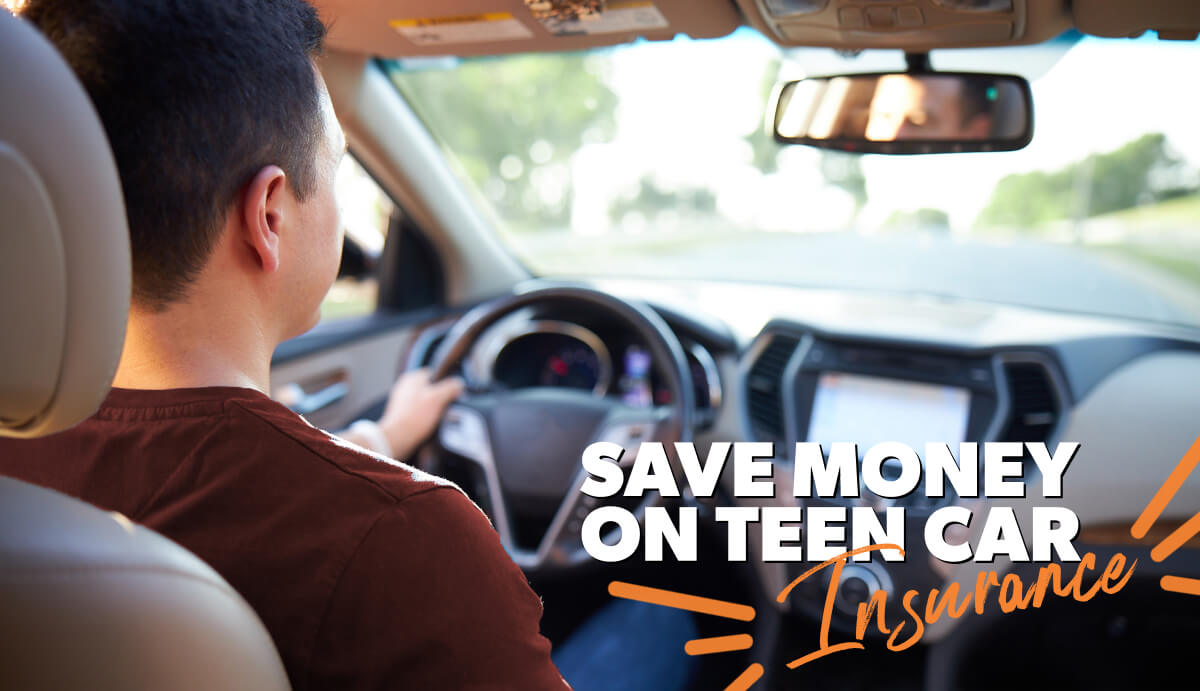
If you’ve got a teen under your roof, we don’t have to tell you their car insurance doesn’t come cheap. As rookies to the road, teenage drivers with their own policy pay way more than the average driver each year for insurance. That’s why most parents opt to add their teen’s car insurance to a family policy—it’s cheaper! But even that strategy will more than double the parent’s car insurance rate (a 152% hike on average).1 Oof!
If those prices have you daydreaming about padlocking your teen’s bedroom, we get it—but put that screwdriver down. You can’t keep them off the road forever! Instead of locking Junior away, the next best thing you can do is teach your teen some safety tips and find ways to save on their car insurance. We can help you out with the second part.
How to Save Money on Teen Car Insurance
Don’t despair over the prospect of high premiums for teen car insurance. We found a bunch of simple ways your teen can lower their auto rates. Let’s check them out!
1. Get Hands-On Experience
According to the CDC, car crashes are the leading cause of death for U.S. teens, and inexperience tops the list of leading causes of teen car crashes.2 Learning the rules of the road can help your teen stay safe—and earn some serious extra credit in the process.
Driver’s education always helps. Carriers offer discounts for taking driver’s ed or any other public safe-driving course that’s offered by the state. Safe and cheap? Sign us up! Ask your insurance provider which driver education programs qualify for a discount in your area.
2. Hit the Books
Most parents have college on the brain when they encourage their kids to make good grades in school. But did you know great academic performance could also get you a break on your teen’s car insurance? It’s true!
So how stellar do your teen’s grades need to be? Well, it’s going to vary from state to state, but a B average or higher will definitely help with rates. (And guess what? This strategy is going to work for saving money on college student insurance too.) Nerds rejoice—and save!
3. Resist That New Car Smell
We never recommend buying a brand-new car because the value drops as soon as you drive it off the lot. But new cars also cost more to insure because the parts and technologies are more expensive to replace if you wreck.
Besides, giving your teen the keys to a new car is like cosigning a loan with your broke cousin Joey for his latest business venture—it’s a really bad idea. (No hate, Joey! We love sushi and burritos, but they don’t mix.)
It’s likely your teen is thinking about some brand-new dream car, but going with a used vehicle will save you an average of 13% on car insurance. So it’s no surprise we’d advise you to buy a used car with cash. (Bonus points if you choose a car that’s also known for safety.) The older the vehicle your teen is driving, the lower the rates.
Our Car Guide can help you learn how to get the best deal on a car you love!
4. Track Your Driving Habits
A lot of companies are coming out with features for additional discounts where they rate drivers based on their driving tendencies rather than just age and gender.
Don't let car insurance costs get you down! Download our checklist for easy ways to save.
Here’s how it works: You plug a device into your vehicle and drive around with it on your car for 30–90 days. Insurers look at things like daily mileage, hard brakes, rapid acceleration and the time of day (or night) you drive—all of which can affect your risk. For teens, that can be an incentive to pump the brakes and drive more safely.
So, is it worth it? Some insurers will reduce your premium just for trying it, while most companies offer at least a 15% discount—maybe more—at the end of the test period for super safe drivers.4
5. Don’t Base Your Decision on Price Alone
We love saving money as much as the next guy, but you can’t put a price tag on your child’s safety—or, for that matter, your sanity.
Here’s the thing: new teen drivers have the highest crash rates of all age groups (at least when there’s not an adult in the car).5 So let’s face facts—at some point, your teen may be in a fender bender. If that happens, you’re going to want to have the right insurance in place. That means having the right amount of liability insurance and other coverages to protect your teen. Plus, you’ll want an advocate fighting for your best interest throughout the claims process.
Maybe you’ve been through the frustration of having a claim denied because the captive or online agent isn’t there for you. That model sucks, since captive agents never fully understand or explain the process or why a claim is or isn’t covered.
That’s where an independent insurance agent comes in handy. An independent agent will see your claim all the way through to the end. There’s no passing you off to a call center where you’ll never talk to the same person twice. There’s no pitting you against the adjuster. Just good, honest customer service through and through.
RamseyTrusted insurance pros live and work in your community. Their kids go to school with your kids. So they have an incentive to help make driving safer for everyone where you live.
6. Work With an Independent Insurance Agent
Of course, working with an independent agent can be a money-saver too. That’s because they’re not limited to a single provider’s options. With access to a whole network of insurers, an independent agent can help you find the best coverage for your family for a price that fits your budget.
Looking for a great deal on car insurance? We can help! Our insurance Endorsed Local Providers (ELPs) are RamseyTrusted experts who have a solid track record of providing excellent service. In fact, many people who work with our RamseyTrusted pros save hundreds of dollars on car insurance or get much better coverage for about the same cost! Find your ELP today!
Frequently Asked Questions on Teen Car Insurance
-
Why can you trust our local insurance pros with car insurance for your teen?
-
You can trust our local insurance pros to help you get the best car insurance for your teen because everyone we endorse is RamseyTrusted. If you don’t know what that means, it’s this: Our providers are advocates for Ramsey's financial and business principles. They know their job is to serve—not sell. And before getting the seal of approval, each provider is fully vetted by our team. They have to earn our trust, and we make sure they keep it through an ongoing relationship.
-
Do I have to add my teenaged driver to my car insurance policy?
-
You do not have to add your teen driver to your car insurance policy, but it’s typically the most affordable way to get them coverage. Most companies will see bundling you both together as lower risk, as opposed to giving the teen their own policy. By the same token, signing a teen onto their own policy is usually going to cost you (or them) way more than adding them to your policy.
-
How much is car insurance for teens?
-
If you insure a teen on your own auto policy—and that’s the most affordable way to do the job—expect to see your premium double, or possibly go even higher.6
-
When do car insurance rates start to drop for teens?
-
Rates for teens won’t really drop much until they reach the age of 25. But remember age is not the only factor insurance carriers use to set premiums. Be sure to ask about other steps you can take to discount car insurance for your teen.
-
Are there insurance programs that will help me save money on teen car insurance?
-
Most insurance companies will offer several ways for you to save money on teen car insurance. Keeping a safe driving record, installing a GPS tracker, bundling your teen’s policy with your own, and showing your provider a good report card from your teen’s school can all help bring that rate down.
-
Why is teen car insurance so expensive?
-
Teen car insurance is more expensive than coverage for any other age group for one simple reason: They’re involved in the most accidents. Until they get some regular experience on the road (usually from 6 months to a year), most new drivers don’t quite have the hang of what’s happening. As the parent of a new teen driver, you can help your fledgling motorist by riding a lot with them during the first year, encouraging them to review driver’s education materials, and limiting their trips to daylight hours—when far fewer accidents happen on average.



